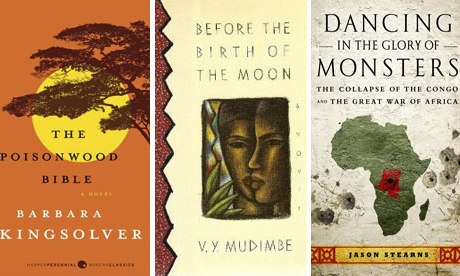
The Poisonwood Bible by Barbara Kingsolver
An American Baptist missionary, Nathan Price, drags his wife and four daughters from Georgia to a remote village in the Belgian Congo to bring the word of his God to the natives. It's 1959, just a year before the country gains its independence.
The Poisonwood Bible spans 30 years in the life of the family as it slowly implodes – under pressures brought on by the intransigent father and political and social upheaval in the country – and then rebuilds itself.
Congo permeates the story, as it grapples with its fledgling independence and a descent into violence exacerbated by the machinations of the colonial power, Belgium, and the CIA.
The novel is written from the perspectives of Orleanna Price and her daughters, who tell the story in turn. We never hear directly from Nathan, but his presence and stifling righteousness loom large, and the King James Bible echoes through the storytelling.
Kingsolver wears her politics on her sleeve and fearlessly skewers colonialism, patriarchy and religious fanaticism, while also reflecting on guilt and personal responsibility.
The author says she "spent nearly 30 years waiting for the wisdom and maturity to write this book". The result is hugely ambitious and enjoyable.
Before the Birth of the Moon by Valentin Y Mudimbe
Set in the 1960s, shortly after Congo's independence from Belgium, Mudimbe's story reflects the political uncertainty and instability of the period. It's told through the complex relationship between a government minister (known only as The Minister) and a prostitute (named Ya), who meet in the steamy world of Kinshasa's bars and nightclubs.
Their personal stories are inextricably linked to the turmoil within the country as it struggles for nationhood. Each has committed a grievous act of betrayal against the other, which costs them dear. Loyalty, deceit and greed lie at the heart of the tale.
The Minister is attracted by the wealth and power of office, and appears to have little concern for his country or its people. Ya left her village to avoid an arranged marriage, and has her heart set on enjoying life in the big city. She wants nothing to do with the anti-government rebellion of her tribe, which is led by her father, a village chief.
But neither can escape the tumultuous events taking place in the country.
Mudimbe, a respected philosopher and writer on Africa, was born in what was then the Belgian Congo. He teaches literature at Duke University in the US.
Dancing in the Glory of Monsters by Jason Stearns
Stearns details how after the 1994 genocide in Rwanda the Hutu-Tutsi conflict spills over the border into Congo and unleashes a web of wars, fuelled by ethnic rivalries and fed by hunger for the country's rich mineral deposits.
"Africa's world war", fought in Congo – a country the size of western Europe – sucks in the armies of nine states, along with a bewildering range of militias. More than 5 million people die, and hundreds of thousands of women are raped. The world looks away, perhaps because this "endless war" becomes ever more messy and complex.
Stearns bravely sets out to counter the west's indifference and ignorance, doing much dangerous and arduous legwork to hear from key players – both perpetrators and victims – and eyewitnesses. He attempts to understand why Congo has been in turmoil for decades and stability has been so elusive.
His account of this brutal and labyrinthine conflict is not for the faint-hearted. Although it's a complicated tale with no heroes or happy endings, it's still gripping – and is delivered with empathy and backed up by meticulous fact-finding.
Stearns, a veteran American human rights activist, has lived and worked in Congo and been an intrepid observer of the country for more than a decade.

